Discover the advancements in Precision aluminum casting for modern industries
Wiki Article
The Effect of Innovative Factory Solutions on Lasting Manufacturing Practices
Cutting-edge shop solutions play a necessary function beforehand sustainable manufacturing techniques. By incorporating recycling technologies and energy-efficient processes, these services considerably lower environmental impact. Shops can redeem useful products, consequently decreasing dependence on virgin resources. As automation and lean manufacturing principles acquire traction, production performance is maximized. Nonetheless, the complete level of these innovations and their implications for the future of producing stay to be discovered.The Function of Advanced Recycling Technologies in Foundries
Advanced reusing innovations are changing the landscape of factories by enhancing product healing and reducing waste. These innovative processes permit foundries to recover useful steels and products from scrap, decreasing reliance on virgin sources. By incorporating advanced sorting, shredding, and melting strategies, factories can successfully extract useful materials from thrown out items, therefore promoting a round economic climate.In addition, these innovations sustain the manufacturing of high-quality alloys and parts, guaranteeing that recycled materials fulfill stringent market requirements (Precision aluminum casting). Because of this, foundries are not only enhancing their product effectiveness but also lowering the environmental impact related to typical production approaches
This change towards advanced recycling not just strengthens financial stability for foundries yet also aligns with international sustainability objectives. Ultimately, the incorporation of these innovations represents a considerable progression in the quest for lasting manufacturing methods within the factory industry.
Energy Performance: Decreasing Intake in Production Processes
Energy effectiveness in making procedures is crucial for lasting procedures. Approaches such as process optimization strategies, eco-friendly power assimilation, and waste heat recovery play crucial duties in lessening energy intake. By concentrating on these locations, manufacturers can considerably minimize their environmental impact while enhancing productivity.Process Optimization Techniques
A substantial number of making centers are progressively adopting procedure optimization techniques to improve power performance and lower consumption. These methods include improving and evaluating manufacturing workflows, determining bottlenecks, and executing automation to enhance procedures. By leveraging information analytics, manufacturers can check energy use in real-time, enabling aggressive modifications to reduce waste. Methods such as Lean Production and 6 Sigma focus on enhancing and getting rid of inadequacies resource allowance. In addition, progressed modern technologies like Web of Points (IoT) sensors supply understandings right into devices efficiency, promoting predictive maintenance that avoids power loss. Overall, these process optimization methods not only add to decreased energy usage yet additionally foster a culture of continual renovation within producing atmospheres, aligning functional exercise with sustainability goals.Renewable Resource Combination
Many manufacturing centers are significantly incorporating renewable resource resources to enhance overall power performance and lower reliance on typical power grids. This adjustment includes the fostering of solar, wind, and biomass energy, which can considerably lower and lower functional prices carbon footprints. By using these sustainable power sources, suppliers not just decrease their ecological effect but additionally boost power resilience. In addition, incorporating eco-friendly energy systems typically involves sophisticated innovations such as energy storage and clever grid services, which optimize energy use and assist in real-time monitoring. This integration sustains suppliers in attaining regulative conformity and conference sustainability goals while cultivating advancement in production procedures. Inevitably, renewable resource assimilation represents a pivotal shift towards even more lasting production methods and lasting viability.Waste Warm Healing
Incorporating sustainable power sources sets the phase for additional improvements in power effectiveness, particularly through the execution of waste warmth recuperation systems. These systems capture excess thermal power generated throughout producing procedures, which would certainly otherwise be shed to the atmosphere. By repurposing this warm, factories can considerably lower their energy consumption, reduced functional costs, and decrease their carbon impact. The recuperated heat can be made use of for numerous applications, such as home heating, power generation, or preheating resources. As a result, waste warmth recovery not just boosts energy effectiveness however additionally contributes to a sustainable production model. Ingenious foundry services that prioritize this technology are leading the method for an ecologically accountable commercial landscape, lining up productivity with environmental stewardship.Using Eco-Friendly Materials in Foundry Workflow
As the demand for sustainable manufacturing methods grows, factories are increasingly transforming to green materials to look these up improve their operations. By incorporating sustainable alternatives, such as recycled steels and bio-based binders, foundries can significantly minimize their environmental footprint. These materials often need less power for handling and can lessen damaging emissions throughout Source manufacturing.Moreover, the fostering of green products not only straightens with regulative criteria but additionally meets customer choices for greener items. Factories are exploring ingenious alternatives, such as utilizing natural ingredients that improve mold and mildew quality while continuing to be non-toxic.
The shift to lasting materials promotes a circular economic climate by advertising resource reuse and decreasing waste. In addition, this change can enhance the overall performance of shop procedures, as environmentally friendly materials usually exhibit superior properties, leading to improved product performance - Aluminum Foundry. Inevitably, the use of green materials represents a vital action toward sustainable manufacturing in the foundry market

Developments in Waste Management and Reduction Techniques
The change in the direction of eco-friendly materials in factory procedures leads the way for developments in waste monitoring and reduction techniques. Ingenious foundry solutions are significantly taking on approaches that reduce waste generation and promote recycling. Methods such as closed-loop systems permit the reuse of materials, substantially decreasing the quantity of waste generated during manufacturing processes. Additionally, developments in filtration and splitting up innovations make it possible for the reliable healing of valuable spin-offs, which can be reintegrated right into the production cycle.Moreover, the execution of real-time monitoring systems provides data-driven understandings right into waste generation patterns, facilitating notified decision-making to maximize source usage. Factories are also checking out biowaste options, converting natural waste into power or functional materials, even more promoting sustainability. These advancements not only add to a round economic situation but also enhance the general ecological efficiency of foundry operations, underscoring the market's dedication to lowering its ecological footprint.
The Impact of Automation on Sustainable Manufacturing
While several sectors go for sustainability, automation becomes a crucial variable in boosting lasting production practices within factories. By incorporating automated systems, shops can accomplish higher efficiency, reduce waste, and lower power usage. Automated procedures enable for exact control over manufacturing parameters, decreasing problems and revamp, which consequently conserves resources.Furthermore, automation promotes the monitoring of ecological influences, enabling real-time adjustments that align with sustainability goals. Precision aluminum casting. Advanced robotics and expert system can optimize product use, leading to significant decreases in scrap and emissions
In addition, automated modern technologies promote safer workplace by handling unsafe jobs, consequently boosting employee wellness while ensuring conformity with environmental guidelines. Generally, the fostering of automation within factories not just improves operations yet likewise plays a pivotal function in advancing lasting manufacturing methods, adding to an image source extra accountable commercial landscape.
Situation Researches: Successful Implementation of Sustainable Shop Practices
Successful execution of lasting methods in factories can be shown via various situation studies that highlight quantifiable outcomes and cutting-edge techniques. One noteworthy example is a mid-sized factory that embraced a closed-loop water reusing system, decreasing water intake by 40% and decreasing wastewater generation. Additionally, this center altered to making use of environmentally friendly mold and mildew materials, which not only improved product high quality yet likewise enhanced worker safety.One more significant case entailed a large shop integrating renewable resource resources, such as photovoltaic panels, which offset 30% of its power requires. This campaign not just reduced operational expenses yet additionally contributed to a substantial reduction in carbon emissions.
Finally, a shop that implemented lean production techniques reported a 25% boost in effectiveness, leading to less material waste and optimized manufacturing procedures. These cases collectively emphasize the tangible advantages and sustainability advancements attainable via innovative shop methods.
Frequently Asked Concerns
Exactly How Do Cutting-edge Foundry Solutions Contribute to Overall Sustainability Goals?
Cutting-edge shop services enhance general sustainability objectives by enhancing resource usage, lowering waste, and improving power performance. These advancements contribute to lower carbon impacts and promote eco liable techniques within the manufacturing market, supporting wider sustainability campaigns.What Are the Economic Conveniences of Taking On Sustainable Factory Practices?
Taking on lasting shop techniques can decrease operational costs, improve resource performance, and boost competitiveness. Additionally, these techniques can draw in eco-conscious clients and capitalists, ultimately leading to enhanced success and long-lasting financial practicality for organizations.Exactly How Can Small Foundries Apply Lasting Technologies Efficiently?
Tiny shops can apply lasting technologies successfully by taking on energy-efficient innovations, optimizing resource use, training personnel on lasting methods, working together with distributors for eco-friendly materials, and engaging in continual renovation procedures to minimize waste and discharges.What Certifications Exist for Lasting Shop Workflow?

Just How Do Customer Preferences Impact Lasting Manufacturing in Foundries?
Consumer preferences considerably affect sustainable manufacturing in foundries by driving demand for green items. As consumers prioritize sustainability, shops adapt their techniques, including greener materials and innovations to meet market assumptions and boost their affordable advantage.By repurposing this warmth, factories can significantly reduce their energy consumption, lower operational prices, and reduce their carbon impact. Shops are additionally exploring biowaste solutions, converting organic waste into energy or usable products, even more promoting sustainability. By integrating automated systems, shops can accomplish better effectiveness, reduce waste, and lower power usage. Another significant case involved a huge foundry integrating eco-friendly energy sources, such as solar panels, which offset 30% of its energy needs. Innovative factory services boost general sustainability objectives by optimizing resource usage, minimizing waste, and improving energy performance.
Report this wiki page